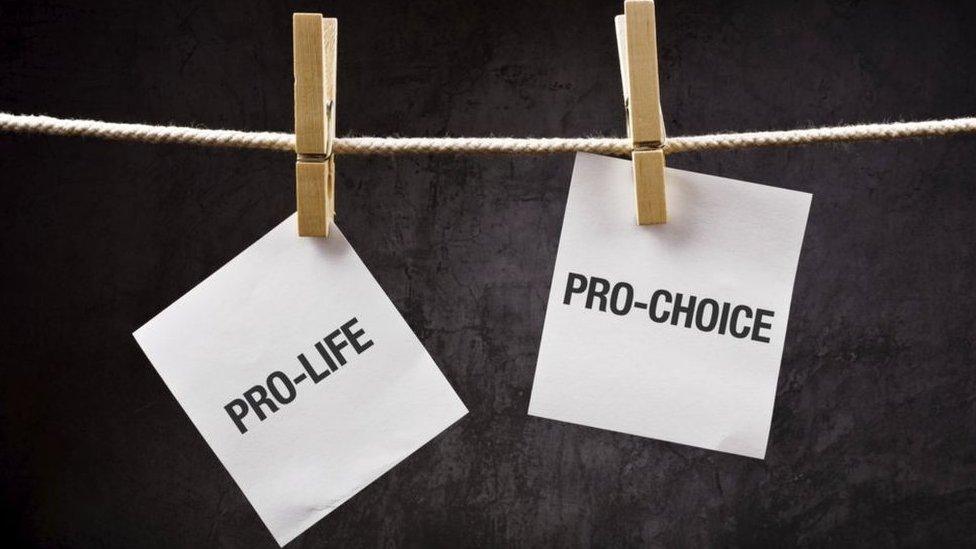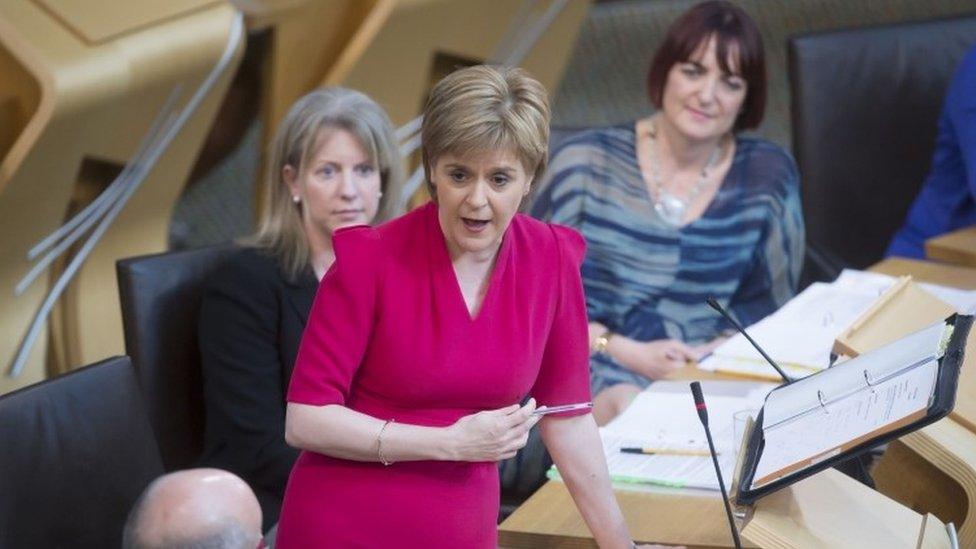To devolve, or not to devolve abortion law
- Published

Sensitive topics under discussion at Holyrood, not least abortion. I shall return to that later. But also today talk anent the most vulnerable in society. The homeless, the offspring of prisoners, people facing mental health challenges.
Kezia Dugdale, for Labour, pursued these subjects with due discretion but, equally, with vigour. For example, she challenged the first minister to adopt a Labour plan to identify and count the number of children facing problems because a parent is incarcerated.
Labour had secured backing for such a proposal in committee and wanted Nicola Sturgeon to guarantee that there would be no attempt to overturn that position when the relevant bill returns to the chamber for further consideration.
Ms Dugdale's case was passionate and forcefully argued. She seemed reluctant to take "maybe" for an answer from the FM.
Weigh the evidence
Repeatedly, Ms Sturgeon noted that it was standard procedure for a government to consider a parliamentary vote, to weigh the evidence - and to respond. It would not be right, she said, to offer a snap judgement when there was contrary advice which might be sound.
Ms Dugdale implied that such a position was letting down the children of Scotland. She demanded an "action plan".
In return, Ms Sturgeon implied that politicians are occasionally tempted to advance the concept of a plan when it is the concomitant action which is merited.
The FM did so by quoting Labour's Iain Gray (sitting by Ms Dugdale's side). She recalled that Mr Gray had previously castigated his own party for having a world-class policy on housing - without the troublesome business of constructing sufficient houses.
At which point, Ms Dugdale looked pained. However, to emphasise, this was a valid and potent contribution by the Labour leader on a topic which, as she noted herself, is seldom highlighted.
Wrong figures
Equally, Ms Sturgeon has a point when she argues for consultation and consideration.
For the Conservatives, Ruth Davidson suggested that not enough was being done to encourage girls to take up science, maths and the like.
Ms Sturgeon produced a positive slew of statistics to suggest that her government was doing plenty.

Ms Davidson said they were the wrong figures: the ones she had showed Scotland lagging. Little instant progress, then, but at the very least the exchange may stimulate Ms Sturgeon and her civil servants to check their working.
Willie Rennie sought to hark back to "the old days". Which prompted a few rascals on the SNP benches to guffaw mischievously.
They seemed to think that the "old days" comprised the period when the Lib Dems had electoral support and shared power at Holyrood - and then Westminster.
No, no, Mr Rennie meant the time when Ms Sturgeon was in opposition. Then, he said, she had backed the teachers' union, the EIS, in opposing national testing. Now, he argued, she was doing the opposite.
Await outcome
Not so, said Ms Sturgeon. The aim was standardised testing to help inform teachers' judgement. Not national testing to replace that judgement. Once more, we must await the outcome in practice.
And, finally, to abortion. Contrary to occasional rumour, politicians do not exist in isolation. They are very well aware - from their surgeries, from their email inbox, from public discourse - that there are certain subjects which particularly exercise sections of the populace.
Of these, abortion is perhaps the quintessential example. For some, it is more than a single policy choice. It is a defining decision. It determines their outlook on individual politicians and on the parliamentary process.
Let us recap a little. Scotland's present parliament was foreshadowed by a White Paper in July 1997 which specified the division of powers.
At the time, the option of devolving control of abortion law was seriously canvassed and contemplated.
Sensitive topic
The late Donald Dewar ultimately took the view, on advice, that it would be better on balance to reserve abortion to Westminster. He feared that, otherwise, the fledgling parliament in Edinburgh would be under heavy pressure from the outset to change the law on terminations.
The Smith Commission considered changing that. Once more, the sensitivity of the topic prevailed.
The commission ended up "strongly of the view" that abortion should be devolved to add to Holyrood's existing panoply of health powers. But they recommended further consideration.

Such consideration is currently under way at the Scotland Office. It would appear that the Secretary of State, David Mundell, is presently minded to respond positively to the Smith Commission's decision in principle. In short, to devolve abortion.
Which brings us to today. Nicola Sturgeon made three points.
One, she favoured the devolution of abortion law. Two, her government has no intention whatsoever of changing said law. Three, her government would write to women's groups stressing the point that, even if devolved, the law would not change.
In which case, said Labour's Rhoda Grant, why devolve the power in the first place? Surely, she argued, devolution was about power for a purpose. Ms Sturgeon said it was right in principle to complete Scotland's health powers.
So where are we? David Mundell has not signed off a decision on this issue. If he opts for devolution, he will signal his intention when the Scotland Bill comes up again soon for consideration.
Naturally, Nicola Sturgeon backs devolution of this power. Her party favours the transfer of all powers to Holyrood. She is scarcely going to say to the Scottish Secretary: "Thanks but no thanks."
Moral dimension
Equally, though, her government has had to promulgate a list of demands for devolution short of full independence. It is fair to say that abortion would not be anywhere close to the top of that interim list.
Further, she is alert to the concern which troubled Donald Dewar all those years ago. Not least because it was echoed today by Rhoda Grant.
Hence her move to pre-empt any move to change the law. Hence her move to offer reassurance to that effect to concerned women's groups.
There is another element to consider. Some argue that Holyrood has palpably matured since that 1997 White Paper and the early days of devolution.
They note that the Scottish Parliament has coped, variously, with challenging topics - such as same sex marriage and end of life legislation - which have a moral dimension (not, to emphasise, that these are directly comparable).
Will abortion be devolved? I believe that to be the direction of travel. Will there be a move to change the law, if it is? Not if Nicola Sturgeon has her way. Which, for now at least, she does.